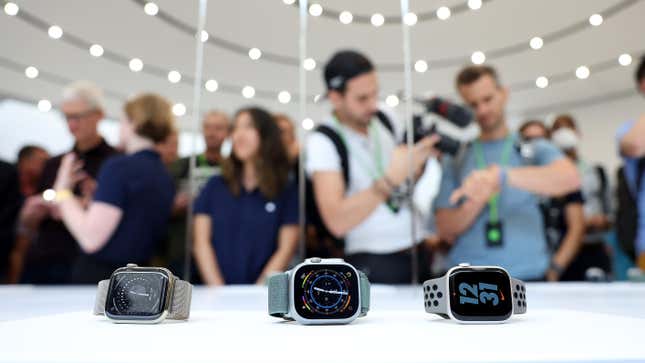The International Trade Commission (ITC) has made a significant decision that may lead to a ban on Apple importing its Apple Watches to the United States. This ruling comes after the ITC found that Apple had violated a patent belonging to the medical technology company Masimo. The ITC’s decision upholds a prior ruling made by a US judge who sided with Masimo in this dispute. The patent at the center of the controversy involves technology used for monitoring blood oxygen levels using light, which is a feature found in the Apple Watch.
It’s important to note that this ruling by the ITC does establish that Apple has indeed infringed on Masimo’s patent, potentially putting a stop to Apple Watch imports in the US. However, it’s not an immediate outcome. The decision now needs to undergo a review by the President, and there may also be opportunities for Apple to file appeals in the future.
The Biden administration is now facing a critical decision with a 60-day window to either veto or allow the import ban on Apple Watches. This decision comes at a time when the rare exercise of presidential veto power over such bans is under scrutiny, as highlighted by a recent report from Reuters.
The Implications of the Apple Watch Ban Decision by the ITC
In the coming two months, the White House will be closely evaluating the implications of the ban on Apple Watches, weighing the potential impact on the technology industry, the economy, and diplomatic relations. This move marks a crucial moment in the ongoing trade tensions between the United States and other nations, with the Apple Watch serving as a symbol of this larger dispute.
An Apple spokesperson informed Reuters, “Masimo has wrongly attempted to use the ITC to keep a potentially lifesaving product from millions of U.S. consumers while making way for their own watch that copies Apple. While today’s decision has no immediate impact on sales of Apple Watch, we believe it should be reversed, and will continue our efforts to appeal.”
In a significant turn of events, Joe Kiani, the CEO of Masimo, has highlighted the far-reaching implications of the recent International Trade Commission (ITC) ruling. He stressed that this ruling conveys a powerful and unequivocal message – that even the mightiest of corporate giants, such as Apple, are subject to the principles of justice and intellectual property rights.

The potential impact of this ruling on various Apple Watch models remains uncertain. The core of the dispute revolves around Masimo’s claim that the Apple Watch Series 6, known for its pioneering blood oxygen tracking feature, has allegedly violated their patented technology.
The ITC’s decision to uphold Masimo’s patent infringement allegations against Apple marks a significant milestone in the ever-evolving realm of technology and intellectual property. It underscores the ongoing imperative of safeguarding innovation and the rights of inventors, regardless of a corporation’s global dominance.
Implications for Apple and the Wearable Technology Market
This ruling serves as a stark reminder that no entity, regardless of its size, influence, or ubiquity, can claim exemption from the principles of fairness and legality. Apple, renowned for its groundbreaking innovations and omnipresent products, is now faced with the ITC’s decision and its potential consequences for its line of Apple Watches.
As the specifics of which Apple Watch models could be affected by this decision remain uncertain, consumers, investors, and technology enthusiasts await further developments with keen interest. The patent dispute not only underscores the importance of protecting intellectual property but also has the potential to disrupt the wearable technology market, impacting industry leaders and the ever-expanding community of smartwatch users.
With the introduction of blood oxygen tracking in the Apple Watch Series 6, wearable technology witnessed a substantial leap in health monitoring capabilities. This innovative feature, celebrated by users worldwide, has now become the focal point of a legal battle that could have far-reaching consequences for the tech industry.
As both Masimo and Apple prepare to navigate the complex legal landscape, the tech world anxiously anticipates how this ruling will shape the future of intellectual property rights and innovation in the realm of wearable devices. It stands as a testament to the ongoing tension between industry giants and the imperative to safeguard the fruits of innovative minds, as we continue to chart the ever-evolving landscape of technological progress.












